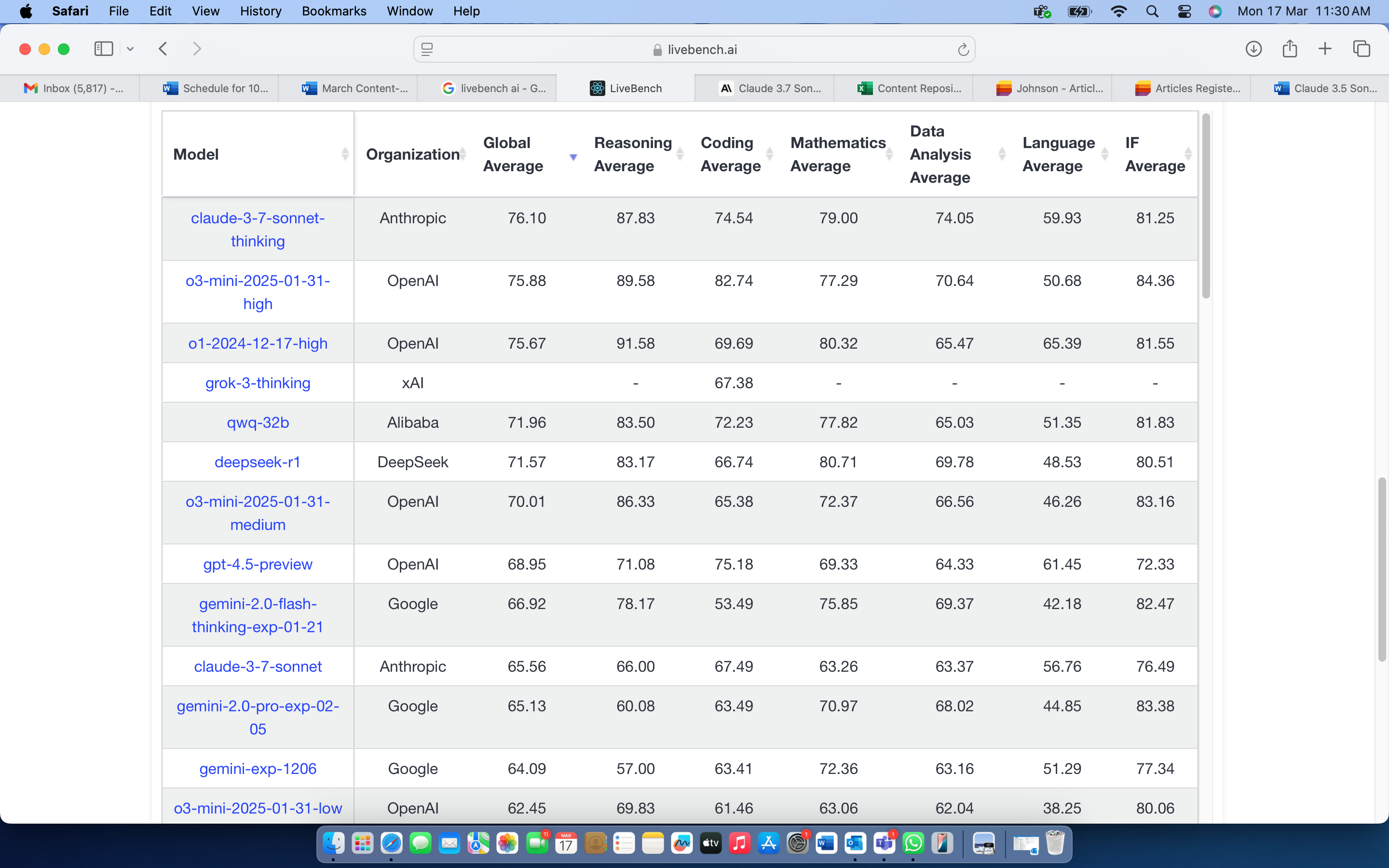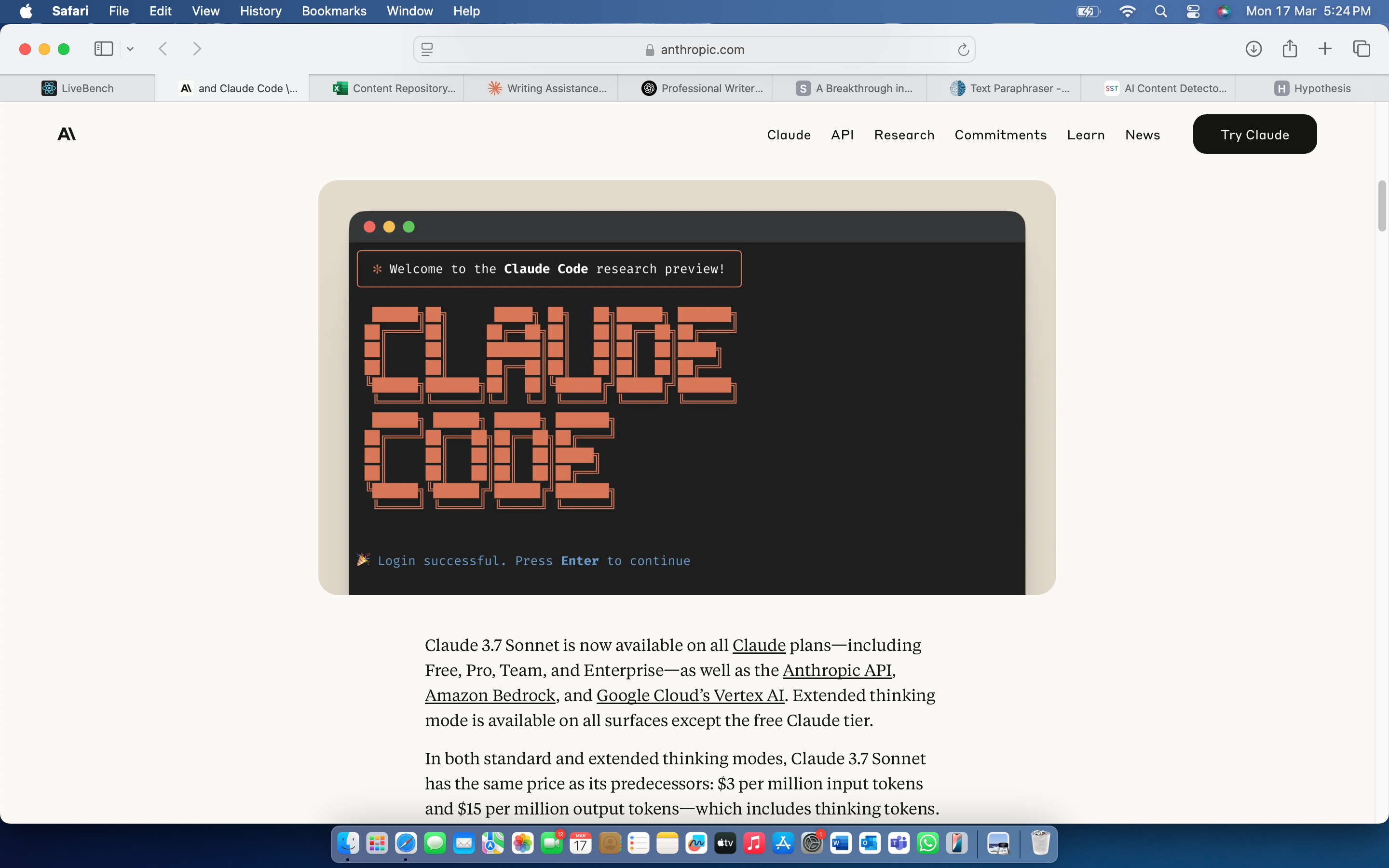According to the latest information on LiveBench, Anthropic’s Claude 3.7 Sonnet has risen to prominence as a top model, demonstrating remarkable performance on various benchmarks. It attained an average score, demonstrating its strong abilities across multiple areas.

In specific, Claude 3.7 Sonnet stood out significantly:
- Coding: The model exhibited outstanding skill with a score of 74.54% in tasks related to code generation.
- Math: Claude 3.7 Sonnet achieved an impressive 79.00%, demonstrating solid mathematical problem-solving skills.
- Reasoning: The model attained a score of 87.83%, demonstrating its skillfulness in intricate reasoning situations.
These findings highlight Claude 3.7 Sonnet’s position as a flexible and effective model in essential areas.
For the latest and most comprehensive performance metrics of Claude 3.7 Sonnet, kindly check the LiveBench website
Claude 3.7 Sonnet: Anthropic’s Leap Forward in AI Reasoning and Automation
Anthropic has introduced Claude 3.7 Sonnet, a revolutionary advancement in its AI model collection, signifying a major progression in artificial intelligence abilities. Launched in February 2025, this newest version is not merely a minor enhancement, it signifies a major transformation in how AI addresses intricate reasoning challenges.
Introducing itself as the first hybrid reasoning model for public use, Claude 3.7 Sonnet combines the quick responsiveness of conventional large language models with the systematic, sequential reasoning once exclusive to specialized systems. This progress makes it perfect for experts, developers, and businesses looking for improved reasoning, sophisticated coding assistance, and practical automation.

With enhanced response precision, a focused coding aide, and advanced AI performance, Claude 3.7 Sonnet establishes a new standard in the industry. This article examines its main characteristics, benefits compared to earlier versions, costs, and practical applications.
What Makes Claude 3.7 Sonnet Groundbreaking?
Claude 3.7 Sonnet pioneers’ innovation by merging two separate operational modes into one model:
- Standard Mode: An improved iteration of Claude 3.5 Sonnet, providing fast replies for daily activities.
- Extended Thinking Mode: An innovative method in which the AI transparently navigates issues sequentially, resembling human thought patterns.
This dual-function design embodies Anthropic’s belief that AI ought to replicate human cognitive adaptability by utilizing the same “mind” for rapid replies and thorough contemplation. Instead of needing users to alternate between various models for various tasks, Claude 3.7 Sonnet modifies its method according to the difficulty of the inquiry and user preferences.
Performance Breakthroughs
The benchmarks convey a powerful narrative. Claude 3.7 Sonnet has reached top-tier performance in various important metrics:
- SWE-bench Validated: Top performance in addressing practical software engineering challenges.
- TAU-bench: Outstanding performance in managing intricate tasks that involve user and tool interactions.
- Coding Capabilities: Significant enhancements in software development activities, ranging from managing intricate codebases to utilizing advanced tools.
Perhaps most notably, initial evaluations from industry collaborators verify Claude’s outstanding abilities in real-world uses:
“According to Cursor, Claude is once again the top performer for practical coding assignments, highlighting notable enhancements in aspects such as managing intricate codebases and utilizing advanced tools.”
Cognition considered it “much superior to any other model in planning code modifications and managing full-stack updates,” whereas Vercel emphasized “remarkable accuracy for intricate agent workflows.” Replit has effectively introduced Claude to “create advanced web applications and dashboards from the ground up, where other models fail.”
The Integration of Reasoning
What distinguishes Claude 3.7 Sonnet from earlier models is its built-in reasoning abilities. In contrast to rival companies that consider reasoning a distinct function needing a separate model, Anthropic has integrated this ability directly into Claude’s design.
This integration provides multiple benefits:
Flawless Experience: Users can transition between brief responses and in-depth reasoning without altering platforms or models.
Managed Thinking: Users of the API can dictate the extent of “thinking” they require from Claude, establishing token limits that reconcile speed, expense, and response quality.
Practical Emphasis: Although performing well on academic standards, Claude 3.7 Sonnet is tailored for actual business uses instead of just theoretical issues.
Enhanced Programming Skills with Claude Code
Alongside Claude 3.7 Sonnet, Anthropic has introduced Claude Code, an agentic command-line tool available in limited research preview. This tool transforms Claude from an assistant into an active collaborator in the software development process.
For developers and engineers, Claude Code helps in coding assistant that streamlines software development and debugging tasks.

What Distinguishes Claude Code?
- Facilitates agentic coding, enabling users to assign tasks directly to the AI.
- Offers extremely precise debugging support.
- Tailored for understanding and altering intricate code.
In contrast to GPT-4’s programming abilities, Claude 3.7 Sonnet provides superior flexibility for practical development settings.
Performance Comparison: Coding Capabilities
| Features | Claude 3.7 Sonnet | GPT-4 Turbo | Gemini 1.5 |
| Agentic Coding | Has Agentic Coding | Has Agentic Coding | Does not have Agentic Coding |
| Debugging Support | Advanced Debugging support | Intermediate Debugging Support | Basic Debugging Support |
| Workflow Automation | Optimized Workflow Automation | Limited Workflow Automation | Limited Workflow Automation |
Enhanced Data Processing and Document Analysis
Claude 3.7 Sonnet broadens its file compatibility, allowing for:
- PDF Documents
- Charts and Graphs
- Legal and Commercial Papers
- Visuals
This capability allows companies and researchers to derive insights from both structured and unstructured data, enhancing the efficiency of AI-driven document analysis significantly.
Performance Improvements Over Claude 3.5 Sonnet
Anthropic has significantly improved Claude 3.7 Sonnet’s speed, accuracy, and problem-solving capabilities compared to its predecessor.
Claude 3.5 vs. Claude 3.7
| Features | Claude3.5 | Claude 3.7 |
| Response Speed | Fast | 2 Time Faster |
| Reasoning Accuracy | Good | 30% More Accurate |
| Coding Support | Basic | Advanced with Claude Code |
| File Processing | Limited | Expanded to More Formats |
Pricing and Availability
Claude 3.7 Sonnet is available across various platforms, including:
- Anthropic API
- Amazon Bedrock
- Google Cloud Vertex AI
Pricing Structure
- Claude Pro: $18/month
- Claude Team: $25/month
- Claude Enterprise: Custom Pricing
Note: Extended Thinking Mode is available only in paid plans.
Real-World Applications
The real-world uses of Claude 3.7 Sonnet go well beyond educational standards. Companies in various sectors are already discovering creative methods to utilize its potential:
Software Engineering
- Automated testing-driven development.
- Intricate debugging and problem-solving.
- Extensive code restructuring.
- Generation of documentation.
Data Analysis
- Gradual analysis of intricate data sets.
- Detecting patterns and irregularities.
- Producing comprehensive analytical reports.
Commercial Strategy
- Assessing intricate business situations.
- Evaluating risks and planning for their reduction.
- Market assessment and prediction.
Client Assistance
- Managing intricate multi-stage customer queries.
- Resolving technical problems.
- Producing comprehensive support documentation.
The GitHub Integration
For developers, Claude 3.7 Sonnet provides improved GitHub integration in all Claude plans. This capability permits users to link their code repositories directly to Claude, allowing it to:
- Resolve issues by comprehending the context of the codebase.
- Create new functionalities that are compatible with the current architecture.
- Create thorough documentation.
- Suggest enhancements derived from code evaluation.
This integration converts Claude from a general assistant into a dedicated coding ally with a profound knowledge of personal, professional, and open-source projects.
Responsible AI Development
Anthropic’s dedication to ethical AI advancement is clear in Claude 3.7 Sonnet. The company announces comprehensive testing and assessment, involving collaboration with outside specialists to confirm the model adheres to strict criteria for security, safety, and dependability.
Significant enhancements in safety consist of:
- Decrease in unnecessary rejections compared to earlier models.
- Finer differentiation between harmful and harmless requests.
- Thorough system card outlining safety assessments.
- Opposition to prompt injection assaults.
Conclusion
Claude 3.7 Sonnet marks a major advancement in AI abilities, merging the rapidity of conventional language models with the analytical reasoning that was once exclusive to specialized systems. Its blended method, merging rapid reactions with clear step-by-step reasoning provides users with unparalleled flexibility and strength.
For companies and developers, the launch of Claude 3.7 Sonnet and Claude Code offers fresh chances to automate intricate tasks, boost efficiency, and address challenges that were once difficult to solve. As AI advances, the incorporation of reasoning abilities could become one of the crucial milestones in transforming these systems into genuinely valuable allies in human activities.
As stated by Anthropic, these advancements lead us “nearer to a future where AI enhances and extends human potential.” With Claude 3.7 Sonnet, that future seems much nearer than it did previously.





